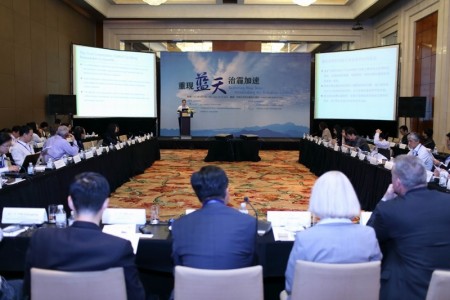By Chelsea Eakin

China has an opportunity to skip mistakes that the US and other countries have made when it comes to tackling air pollution and climate change.
That is one of the main themes coming out of this week’s Air Quality Workshop in Beijing, which brought together 80 international and Chinese experts and officials from China’s Beijing-Tianjin-Hebei (“Jing-Jin-Ji”) region. The Workshop was co-organized by the Paulson Institute and the China Center for International Economic Exchanges (CCIEE).
The most important lesson, according to the experts, is “co-control,” meaning simultaneously fighting air pollution and dealing with carbon emissions that cause climate change. When the US first began tackling air pollution in the 1960s, climate change and global warming were not yet part of everyday vocabulary. Carbon reduction was not included as part of the clean air conversation, which focused almost exclusively on traditional air pollutants such as PM2.5, sulfur dioxide and nitrogen oxides. But today, the cutting edge approach is to tackle both.
“China has the advantage of standing on the shoulders of 40-50 years of development of pollution control technologies,” said Hal Harvey, CEO of Energy Innovation and Paulson Institute Senior Fellow, who was a key organizer of the workshop. “Technologies exist that are proven, cost effective, and in mass production.”
Energy efficiency is key to co-control, Harvey said, noting that there is almost no sector of the Chinese economy where energy consumption cannot be cut in half. “Energy efficiency can fix both CO2 and conventional pollution. It can be as important and simple as making buildings well insulated. Energy efficiency saves money and accelerates the transition to a high quality economy.”
In the coming weeks, CCIEE, the Energy Foundation, and others are preparing documents with the help of feedback from the workshop that will support policymakers prepare for the new air law that will take effect on January 1, 2015, as well as deal with enforcement and implementation of environmental policies. Many of the experts at the workshop have already made significant contributions to air quality policy in China and will continue to serve as resources for local Environmental Protection Bureaus (EPBs) and national policymakers.
If great challenges also come with great opportunities, one could imagine that the Jing-Jin-Ji region could aspire to become China?s California in terms of its transition to cleaner air. “I wonder whether people in Los Angeles back then had any idea that California would become such an example of progress – a model for the whole world in terms of energy efficiency and air quality,” said Elle Carberry, managing director of the Paulson Institute’s Climate Change and Air Quality Program, during her opening speech at the workshop. “California is an example that we can keep our eyes focused on, to remind us where we are going with our efforts.”


